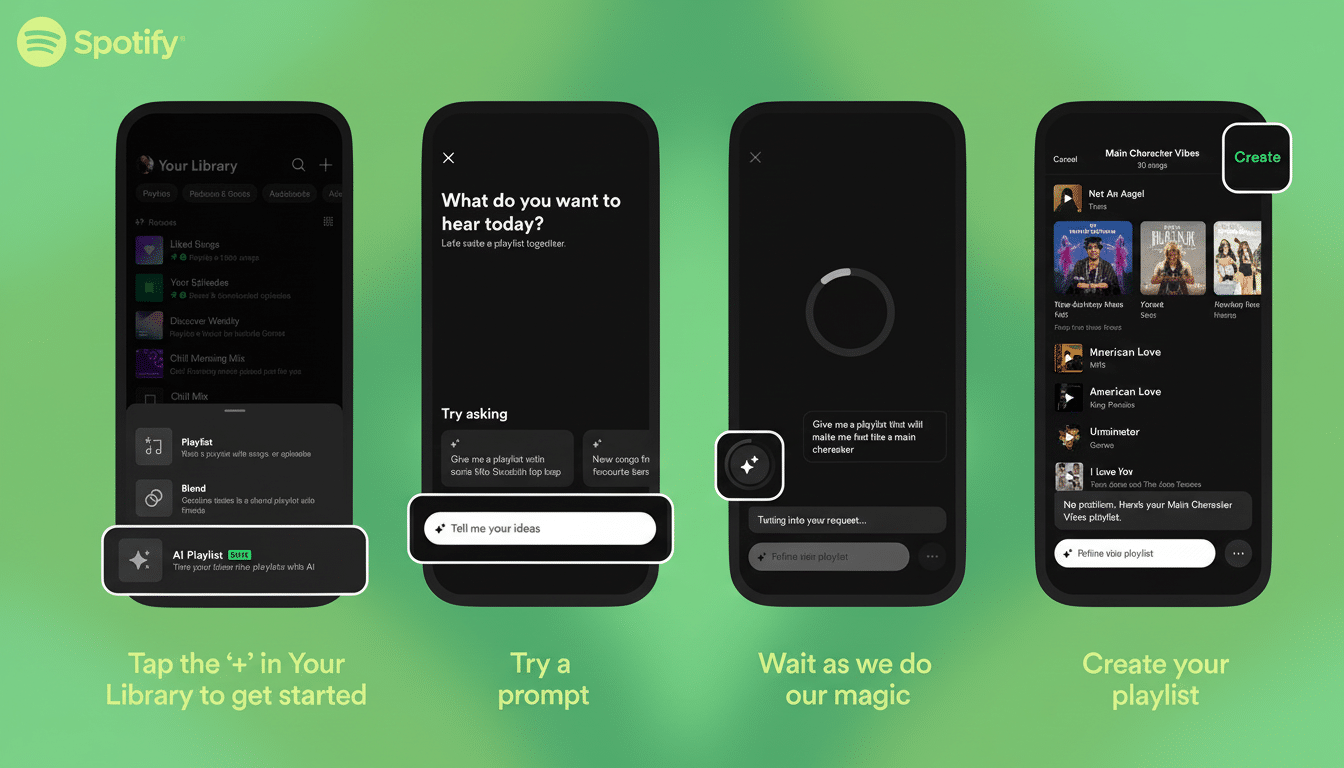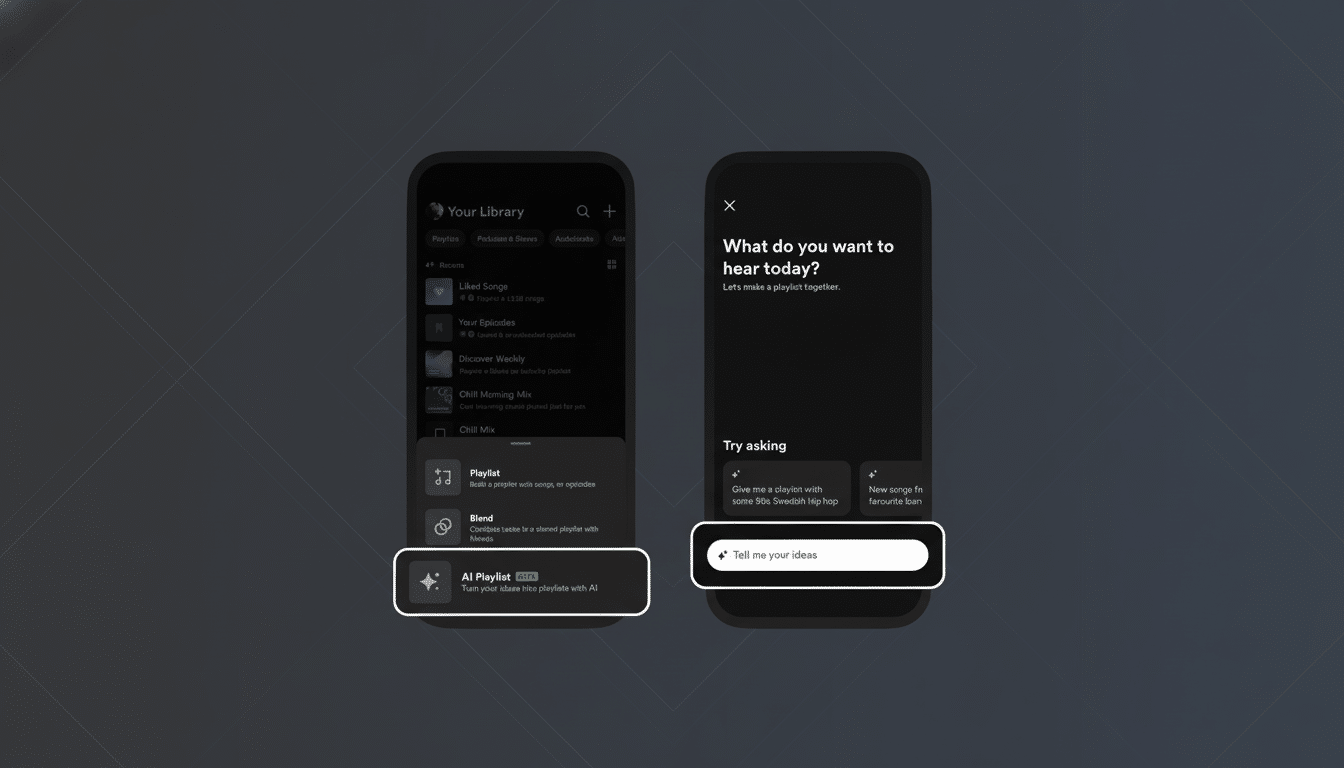Spotify is testing a new feature called Prompt Playlist, an AI-powered tool that translates moments such as late-night vibes or Monday motivation into auto-updating playlists. Discovered by the celebrated reverse engineer Jane Manchun Wong on X, the test hints at a new way to construct playlists: you set rules once, and then let the app refresh them at intervals that suit your habits.
What the new Prompt Playlist tool actually does
The interface is designed around a plain prompt box where you enter instructions like “mellow electronics for after midnight” or “upbeat indie for Friday prep.” Right alongside that, Spotify displays management options: You can keep the playlist static, refresh it every day, or let it regenerate once a week at a time of your choosing. I’ve not seen more than one schedule appear to be in effect at once, so you’ll always have some say in how often the soundtrack changes.

Underneath the scheduling panel, a group of what are known as “enhancers” hint at how the AI chooses your music: It dips into your listening history, mines global news and cultural trends, and weaves around genres, artists, or other filters.
In practice, that might be a playlist featuring recent obsessions commingling with songs percolating up on foreign charts or a ruleset emphasizing niche subgenres you specify.
Why it matters for personalization and daily listening
Spotify has been inching deeper into AI-fueled curation with tools like an AI DJ and prompt-based AI Playlist beta testing in some markets. Prompt Playlist takes that idea one step further by introducing automation. Rather than a one-time mood mix, users are given repeated, rule-based soundtracks that mirror how people actually listen: for commutes, late-night wind-downs, post-work runs, or Sunday resets.
The stakes are real for a platform that has more than 600 million monthly users. Personalization is a strong driver of in-app time, discovery, and retention. According to the International Federation of the Phonographic Industry, about two-thirds of recorded music revenue worldwide comes from streaming — which is why services compete so furiously to be deemed the most relevant, most timely listening companion. It doesn’t just make playlists that are convenient; it schedules them to ensure you’re reinforced in your daily habits and hear new tracks when the moment is right.
Imagine practical use cases: a focus playlist that renews every weekday morning, a high-BPM set that pulls from your most played workout tracks each week, or a late-night ambient mix that quietly updates with new releases and what you’ve been listening to. Small, expected refreshes can help minimize curation fatigue while ensuring your library remains lively.

How it compares with rivals in personalized streaming
Rivals already stress personalization — Apple Music has Personal Mixes and Autoplay; YouTube Music offers My Supermix and activity filters; Deezer’s Flow and Pandora Modes adapt to taste. But explicit, user-set rules combined with scheduled updates are few and far between. That’s where Prompt Playlist could shine: It mixes AI prompts’ immediacy with a timer that reinterprets your instructions periodically, perhaps woven in with real-world signals like trends and charts.
If it’s done right, this could be more like a radio station that you program yourself — one that gets better as your tastes and the culture at large evolve — than a static list that you need to babysit.
The data and privacy angle for AI-powered playlists
Since the feature pulls from listening history and “world” signals, it also raises all the typical questions about data use and transparency. Spotify already uses behavior to fuel recommendations and charts, and any broader use of signals like news or cultural trends will require clear disclosures. The test interface has privacy settings and the option to make playlists private, which is necessary if these automations are going to feel personal instead of invasive.
Anticipate that savvy listeners will hunt for granular toggles — to opt in to trend-driven picks but opt out of certain sources, or even lock into genre and era constraints. The best prompt playlist will allow users to steer the source mix rather than provide an opaque black box.
What to expect next from Spotify’s Prompt Playlist test
Spotify has not publicly confirmed Prompt Playlist, and early glimpses indicate that it is currently still an internal experiment. That said, the refined UI does point the way. If it bears any resemblance to AI DJ and AI Playlists, expect restricted testing in a few markets before a full release.
If successful, Prompt Playlist could blur the line between playlists and schedules and turn your late-night moods, gym routines, and morning habits into self-renewing stations. For Spotify, it’s another lever to pull to drive engagement. For listeners, it’s a promise that curating won’t be done manually as much and discovery will be more timely: Music will show up just when you need it.

